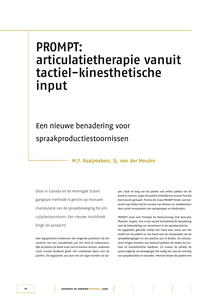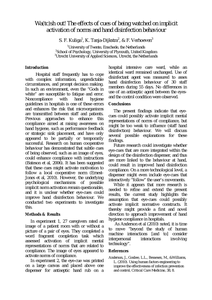PROMPT is a tactile-kinesthetic approach for assessment and treatment of speech production disorders. PROMPT uses tactile-kinethetic cues to facilitate motor speech behaviors. Therapy is structured from basic motor speech patterns with much tactile-lkinesthetic cueing, towards complex motor speech activities with less cueing. This article describes the purpose and contents of PROMPT assessment and therapy.
DOCUMENT

PROMPT wordt toegepast als een methode bij de verberting van spraakproductie bij volwasssenen en kinderen met diverse stoornissen. Het gaat om een nieuwe benadering waarbij de logopedist van buitenaf hulp biedt bij het vormen van klinkers en medeklinkers door het actief manipuleren van spiergroepen en lokalisaties.In de traidotionele spraaktherapie wordt het spraakprobleem vaak gezien als een reeks van foneemafwijkingen, terwijl de motorische benadering van PROMPT het spraakprobleem juist beschouwt als een reeks van bewegingsafwijkingen. het artikle beschijrft de uitgangspunten en opzet van deze voor Europa nog vrij nieuwe therapie.
DOCUMENT
In this paper, we report on the initial results of an explorative study that aims to investigate the occurrence of cognitive biases when designers use generative AI in the ideation phase of a creative design process. When observing current AI models utilised as creative design tools, potential negative impacts on creativity can be identified, namely deepening already existing cognitive biases but also introducing new ones that might not have been present before. Within our study, we analysed the emergence of several cognitive biases and the possible appearance of a negative synergy when designers use generative AI tools in a creative ideation process. Additionally, we identified a new potential bias that emerges from interacting with AI tools, namely prompt bias.
DOCUMENT

Presentation Nederlandse Vereniging voor Criminologie Congres 2022
DOCUMENT
Presentation SECREV 2022
DOCUMENT
ChatGPT’s emergence and subsequent evolution as a generative artificial intelligence tool introduces new ways of assisting students with research design. Fostering research skills with undergraduate students presents opportunities and challenges for faculty to aid with drafting research plans, questions for investigation, and methods for conducting the research. While some educators rightfully voice concerns over the ethical aspects of such a tool, this article will draw on my own experiences using ChatGPT 4.0 as a tool in research project supervision. I demonstrate how to prompt ChatGPT to give useful suggestions that can be used as actionable feedback. I also discuss how to instruct students to include ChatGPT in their research methodology when using the tool to refine research questions.
LINK
Considering recent calls for change towards a more liveable tourism academia, critical participatory action research is combined with duoethnography to develop The Academic Line—a humorous comic project about academic life. Traditional theories of humour are used to leverage the effectiveness of comics as communicative devices and explored how and to what extent the project promoted solidarity, reflexivity, well-being, and change. This study reveals the concrete commitment to fostering change within and potentially improving academia, and to experiment with a form of communication, which is still underexplored in the scholarly sphere but fruitfully applied in other contexts to raise awareness of and prompt discussion about crucially important issues.
DOCUMENT

The concept of biodiversity, which usually serves as a shorthand to refer to the diversity of life on Earth at different levels (ecosystems, species, genes), was coined in the 1980s by conservation biologists worried over the degradation of ecosystems and the loss of species, and willing to make a case for the protection of nature – while avoiding this “politically loaded” term (Takacs, 1996). Since then, the concept has been embedded in the work of the Convention on Biological Diversity (CBD, established in 1992) and of the Intergovernmental science-policy Platform on Biodiversity and Ecosystem Services (IPBES, aka ‘the IPCC for biodiversity’, established in 2012). While the concept has gained policy traction, it is still unclear to which extent it has captured the public imagination. Biodiversity loss has not triggered the same amount of attention or controversy as climate change globally (with some exceptions). This project, titled Prompting for biodiversity, investigates how this issue is mediated by generative visual AI, directing attention to both how ‘biodiversity’ is known and imagined by AI and to how this may shape public ideas around biodiversity loss and living with other species.
LINK
Hospital staff frequently has to cope with complex information, unpredictable circumstances, and prompt decision making. In such an environment, even the “Gods in white” are susceptible to fatigue and error. Noncompliance with hand hygiene guidelines in hospitals is one of these errors and enhances the risk that microorganisms are transmitted between staff and patients. Previous approaches to enhance this compliance aimed at raising awareness on hand hygiene, such as performance feedback or strategic sink placement, and have only appeared to be partially or temporarily successful. Research on human cooperative behaviour has demonstrated that subtle cues of being observed, such as an image of eyes, could enhance compliance with instructions (Bateson et al, 2006). It has been suggested that these cues might activate motivation to follow a local cooperative norm (Ernest-Jones et al, 2010). However, the underlying psychological mechanisms of possible implicit norm activation remain questionable, and it is unclear whether eye-cues could improve hand disinfection behaviour. We conducted two experiments to investigate this
DOCUMENT

Manual crack inspection is labor-intensive and impractical at scale, prompting a shift toward AI-based segmentation methods. We present a novel crack segmentation model that leverages the Segment Anything Model 2 (SAM 2) through transfer learning to detect cracks on masonry surfaces. Unlike prior approaches that rely on encoders pretrained for image classification, we fine-tune SAM 2, originally trained for segmentation tasks, by freezing its Hiera encoder and FPN neck, while adapting its prompt encoder, LoRA matrices, and mask decoder for the crack segmentation task. No prompt input is used during training to avoid detection overhead. Our aim is to increase robustness to noise and enhance generalizability across different surface types. This work demonstrates the potential of foundational segmentation models in enabling more reliable and field-ready AI-based crack detection tools.
DOCUMENT